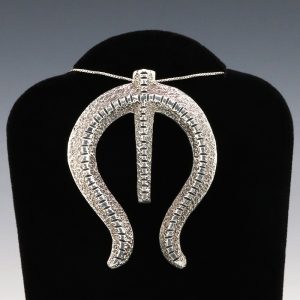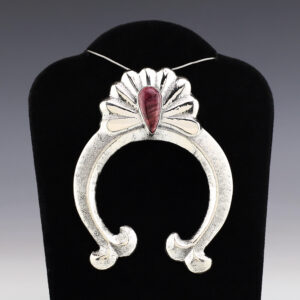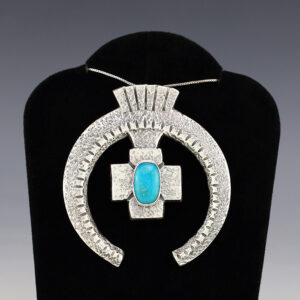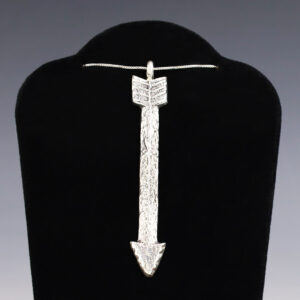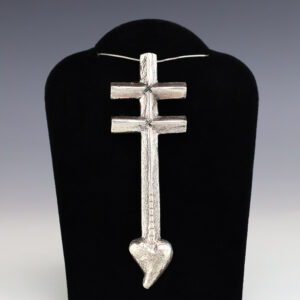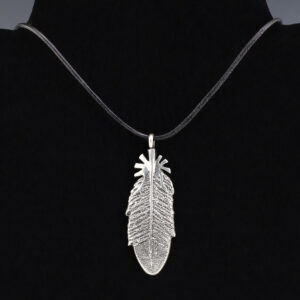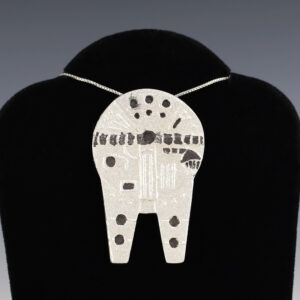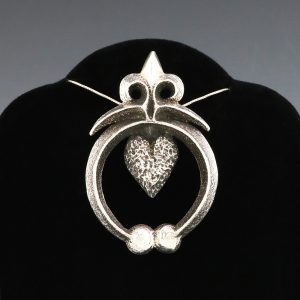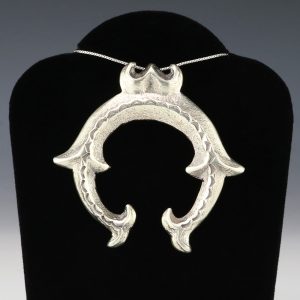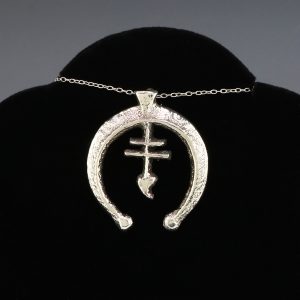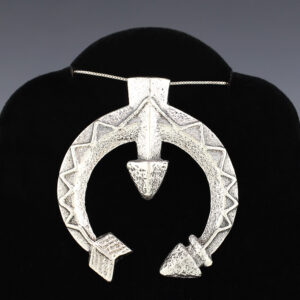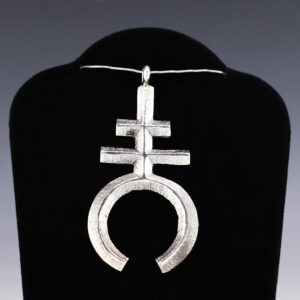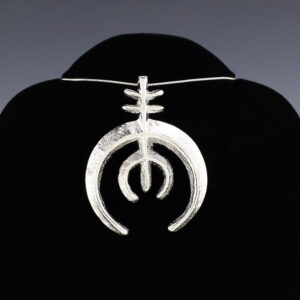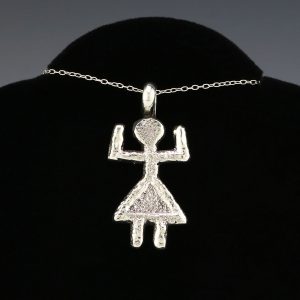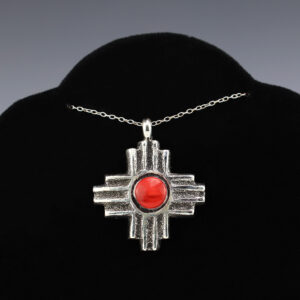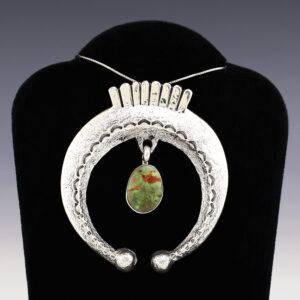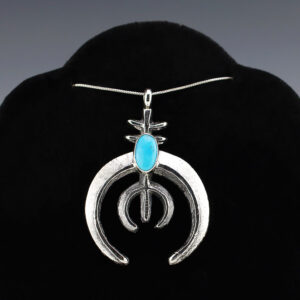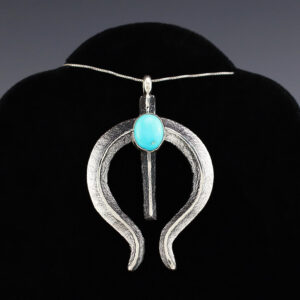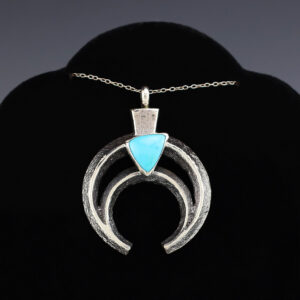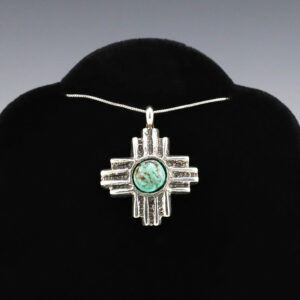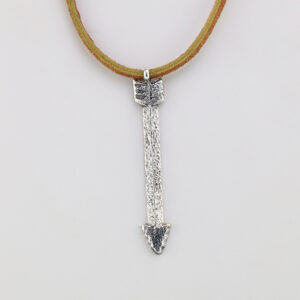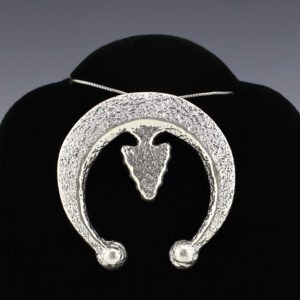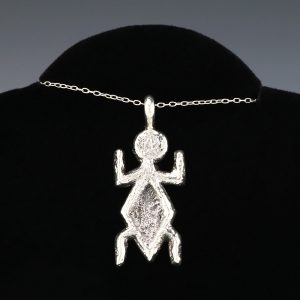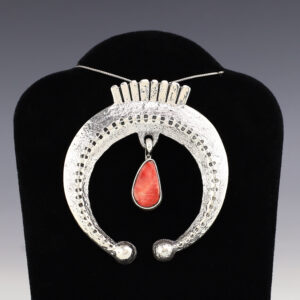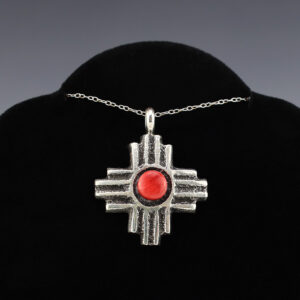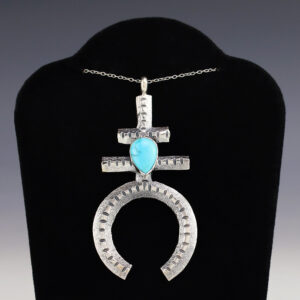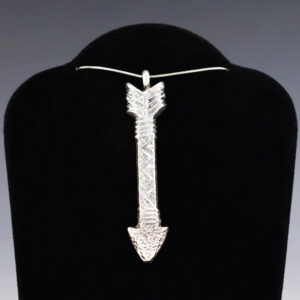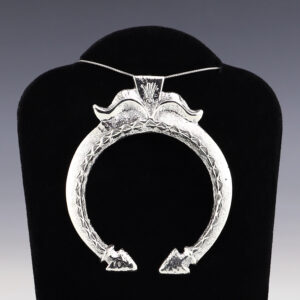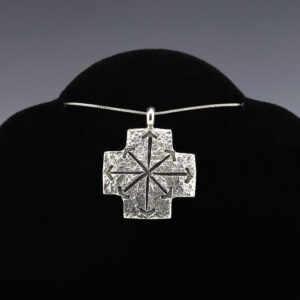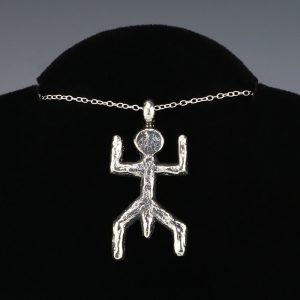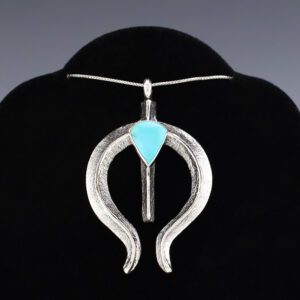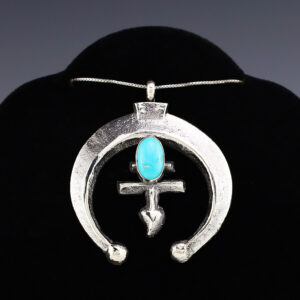GARY CUSTER NAVAJO STERLING SILVER NAJA PENDANT
In the mid 1800s, Navajo silversmiths started to use sand casting as one of their silversmithing techniques. Today, silversmiths still use this technique by carving a design in tufa stone (a porous limestone) and then placing another stone against it. The two pieces are fastened together and molten silver is...
NATIVE AMERICAN NAVAJO SPINY OYSTER NAJA PENDANT BY GARY CUSTER
In the mid 1800s, Navajo silversmiths started to use sand casting as one of their silversmithing techniques. Today, silversmiths still use this technique by carving a design in tufa stone (a porous limestone) and then placing another stone against it. The two pieces are fastened together and molten silver is...
NATIVE AMERICAN NAVAJO STERLING & CORAL PENDANT BY REBECCA BEGAY
In the mid 1800s, Navajo silversmiths started to use sand casting as one of their silversmithing techniques. Today, silversmiths still use this technique by carving a design in tufa stone (a porous limestone) and then placing another stone against it. The two pieces are fastened together and molten silver is...
NATIVE AMERICAN NAVAJO STERLING SILVER & TURQUOISE NAJA PENDANT BY GARY CUSTER
In the mid 1800s, Navajo silversmiths started to use sand casting as one of their silversmithing techniques. Today, silversmiths still use this technique by carving a design in tufa stone (a porous limestone) and then placing another stone against it. The two pieces are fastened together and molten silver is...
NATIVE AMERICAN NAVAJO STERLING SILVER ARROW PENDANT BY GARY CUSTER
In the mid 1800s, Navajo silversmiths started to use sand casting as one of their silversmithing techniques. Today, silversmiths still use this technique by carving a design in tufa stone (a porous limestone) and then placing another stone against it. The two pieces are fastened together and molten silver is...
NATIVE AMERICAN NAVAJO STERLING SILVER DOUBLE CROSS PENDANT BY GARY CUSTER
In the mid 1800s, Navajo silversmiths started to use sand casting as one of their silversmithing techniques. Today, silversmiths still use this technique by carving a design in tufa stone (a porous limestone) and then placing another stone against it. The two pieces are fastened together and molten silver is...
NATIVE AMERICAN NAVAJO STERLING SILVER FEATHER PENDANT BY GARY CUSTER
In the mid 1800s, Navajo silversmiths started to use sand casting as one of their silversmithing techniques. Today, silversmiths still use this technique by carving a design in tufa stone (a porous limestone) and then placing another stone against it. The two pieces are fastened together and molten silver is...
NATIVE AMERICAN NAVAJO STERLING SILVER HORSE PENDANT BY GARY CUSTER
In the mid 1800s, Navajo silversmiths started to use sand casting as one of their silversmithing techniques. Today, silversmiths still use this technique by carving a design in tufa stone (a porous limestone) and then placing another stone against it. The two pieces are fastened together and molten silver is...
NATIVE AMERICAN NAVAJO STERLING SILVER MILLENNIUM FALCON PENDANT BY LEE BEGAY
In the mid 1800s, Navajo silversmiths started to use sand casting as one of their silversmithing techniques. Today, silversmiths still use this technique by carving a design in tufa stone (a porous limestone) and then placing another stone against it. The two pieces are fastened together and molten silver is...
NATIVE AMERICAN NAVAJO STERLING SILVER MOTHER & CHILD PENDANT BY GARY CUSTER
In the mid 1800s, Navajo silversmiths started to use sand casting as one of their silversmithing techniques. Today, silversmiths still use this technique by carving a design in tufa stone (a porous limestone) and then placing another stone against it. The two pieces are fastened together and molten silver is...
NATIVE AMERICAN NAVAJO STERLING SILVER NAJA PENDANT
In the mid 1800s, Navajo silversmiths started to use sand casting as one of their silversmithing techniques. Today, silversmiths still use this technique by carving a design in tufa stone (a porous limestone) and then placing another stone against it. The two pieces are fastened together and molten silver is...
NATIVE AMERICAN NAVAJO STERLING SILVER NAJA PENDANT BY GARY CUSTER
In the mid 1800s, Navajo silversmiths started to use sand casting as one of their silversmithing techniques. Today, silversmiths still use this technique by carving a design in tufa stone (a porous limestone) and then placing another stone against it. The two pieces are fastened together and molten silver is...
NATIVE AMERICAN NAVAJO STERLING SILVER NAJA PENDANT BY GARY CUSTER
In the mid 1800s, Navajo silversmiths started to use sand casting as one of their silversmithing techniques. Today, silversmiths still use this technique by carving a design in tufa stone (a porous limestone) and then placing another stone against it. The two pieces are fastened together and molten silver is...
NATIVE AMERICAN NAVAJO STERLING SILVER NAJA PENDANT BY GARY CUSTER
In the mid 1800s, Navajo silversmiths started to use sand casting as one of their silversmithing techniques. Today, silversmiths still use this technique by carving a design in tufa stone (a porous limestone) and then placing another stone against it. The two pieces are fastened together and molten silver is...
NATIVE AMERICAN NAVAJO STERLING SILVER NAJA PENDANT BY GARY CUSTER
In the mid 1800s, Navajo silversmiths started to use sand casting as one of their silversmithing techniques. Today, silversmiths still use this technique by carving a design in tufa stone (a porous limestone) and then placing another stone against it. The two pieces are fastened together and molten silver is...
NATIVE AMERICAN NAVAJO STERLING SILVER NAJA PENDANT BY GARY CUSTER
In the mid 1800s, Navajo silversmiths started to use sand casting as one of their silversmithing techniques. Today, silversmiths still use this technique by carving a design in tufa stone (a porous limestone) and then placing another stone against it. The two pieces are fastened together and molten silver is...
NATIVE AMERICAN NAVAJO STERLING SILVER PETROGLYPH PENDANT BY GARY CUSTER
In the mid 1800s, Navajo silversmiths started to use sand casting as one of their silversmithing techniques. Today, silversmiths still use this technique by carving a design in tufa stone (a porous limestone) and then placing another stone against it. The two pieces are fastened together and molten silver is...
NAVAJO SONORAN GOLD TURQUOISE ARROWHEAD PENDANT BY GARY CUSTER
In the mid 1800s, Navajo silversmiths started to use sand casting as one of their silversmithing techniques. Today, silversmiths still use this technique by carving a design in tufa stone (a porous limestone) and then placing another stone against it. The two pieces are fastened together and molten silver is...
NAVAJO STERLING SILVER & SPINY OYSTER ZIA PENDANT BY GARY CUSTER
In the mid 1800s, Navajo silversmiths started to use sand casting as one of their silversmithing techniques. Today, silversmiths still use this technique by carving a design in tufa stone (a porous limestone) and then placing another stone against it. The two pieces are fastened together and molten silver is...
NAVAJO STERLING SILVER & TURQUOISE NAJA PENDANT BY GARY CUSTER
In the mid 1800s, Navajo silversmiths started to use sand casting as one of their silversmithing techniques. Today, silversmiths still use this technique by carving a design in tufa stone (a porous limestone) and then placing another stone against it. The two pieces are fastened together and molten silver is...
NAVAJO STERLING SILVER & TURQUOISE NAJA PENDANT BY GARY CUSTER
In the mid 1800s, Navajo silversmiths started to use sand casting as one of their silversmithing techniques. Today, silversmiths still use this technique by carving a design in tufa stone (a porous limestone) and then placing another stone against it. The two pieces are fastened together and molten silver is...
NAVAJO STERLING SILVER & TURQUOISE NAJA PENDANT BY GARY CUSTER
In the mid 1800s, Navajo silversmiths started to use sand casting as one of their silversmithing techniques. Today, silversmiths still use this technique by carving a design in tufa stone (a porous limestone) and then placing another stone against it. The two pieces are fastened together and molten silver is...
NAVAJO STERLING SILVER & TURQUOISE NAJA PENDANT BY GARY CUSTER
In the mid 1800s, Navajo silversmiths started to use sand casting as one of their silversmithing techniques. Today, silversmiths still use this technique by carving a design in tufa stone (a porous limestone) and then placing another stone against it. The two pieces are fastened together and molten silver is...
NAVAJO STERLING SILVER & TURQUOISE NAJA PENDANT BY GARY CUSTER
In the mid 1800s, Navajo silversmiths started to use sand casting as one of their silversmithing techniques. Today, silversmiths still use this technique by carving a design in tufa stone (a porous limestone) and then placing another stone against it. The two pieces are fastened together and molten silver is...
NAVAJO STERLING SILVER & TURQUOISE THUNDERBIRD PENDANT BY GARY CUSTER
In the mid 1800s, Navajo silversmiths started to use sand casting as one of their silversmithing techniques. Today, silversmiths still use this technique by carving a design in tufa stone (a porous limestone) and then placing another stone against it. The two pieces are fastened together and molten silver is...
NAVAJO STERLING SILVER & TURQUOISE ZIA PENDANT BY GARY CUSTER
In the mid 1800s, Navajo silversmiths started to use sand casting as one of their silversmithing techniques. Today, silversmiths still use this technique by carving a design in tufa stone (a porous limestone) and then placing another stone against it. The two pieces are fastened together and molten silver is...
NAVAJO STERLING SILVER ARROW PENDANT BY GARY CUSTER
In the mid 1800s, Navajo silversmiths started to use sand casting as one of their silversmithing techniques. Today, silversmiths still use this technique by carving a design in tufa stone (a porous limestone) and then placing another stone against it. The two pieces are fastened together and molten silver is...
NAVAJO STERLING SILVER NAJA PENDANT BY GARY CUSTER
In the mid 1800s, Navajo silversmiths started to use sand casting as one of their silversmithing techniques. Today, silversmiths still use this technique by carving a design in tufa stone (a porous limestone) and then placing another stone against it. The two pieces are fastened together and molten silver is...
NAVAJO STERLING SILVER NAJA PENDANT BY GARY CUSTER
In the mid 1800s, Navajo silversmiths started to use sand casting as one of their silversmithing techniques. Today, silversmiths still use this technique by carving a design in tufa stone (a porous limestone) and then placing another stone against it. The two pieces are fastened together and molten silver is...
NAVAJO STERLING SILVER PETROGLYPH PENDANT BY GARY CUSTER
In the mid 1800s, Navajo silversmiths started to use sand casting as one of their silversmithing techniques. Today, silversmiths still use this technique by carving a design in tufa stone (a porous limestone) and then placing another stone against it. The two pieces are fastened together and molten silver is...
SPINY OYSTER NAJA PENDANT BY GARY CUSTER NAVAJO
In the mid 1800s, Navajo silversmiths started to use sand casting as one of their silversmithing techniques. Today, silversmiths still use this technique by carving a design in tufa stone (a porous limestone) and then placing another stone against it. The two pieces are fastened together and molten silver is...
STERLING SILVER & SPINY OYSTER ZIA PENDANT BY GARY CUSTER NAVAJO
In the mid 1800s, Navajo silversmiths started to use sand casting as one of their silversmithing techniques. Today, silversmiths still use this technique by carving a design in tufa stone (a porous limestone) and then placing another stone against it. The two pieces are fastened together and molten silver is...
STERLING SILVER & TURQUOISE NAJA PENDANT BY GARY CUSTER NAVAJO
In the mid 1800s, Navajo silversmiths started to use sand casting as one of their silversmithing techniques. Today, silversmiths still use this technique by carving a design in tufa stone (a porous limestone) and then placing another stone against it. The two pieces are fastened together and molten silver is...
STERLING SILVER ARROW PENDANT BY GARY CUSTER NAVAJO
In the mid 1800s, Navajo silversmiths started to use sand casting as one of their silversmithing techniques. Today, silversmiths still use this technique by carving a design in tufa stone (a porous limestone) and then placing another stone against it. The two pieces are fastened together and molten silver is...
STERLING SILVER NAJA PENDANT BY GARY CUSTER NAVAJO
In the mid 1800s, Navajo silversmiths started to use sand casting as one of their silversmithing techniques. Today, silversmiths still use this technique by carving a design in tufa stone (a porous limestone) and then placing another stone against it. The two pieces are fastened together and molten silver is...
STERLING SILVER PENDANT BY GARY CUSTER NAVAJO
In the mid 1800s, Navajo silversmiths started to use sand casting as one of their silversmithing techniques. Today, silversmiths still use this technique by carving a design in tufa stone (a porous limestone) and then placing another stone against it. The two pieces are fastened together and molten silver is...
STERLING SILVER PETROGLYPH PENDANT BY GARY CUSTER NAVAJO
In the mid 1800s, Navajo silversmiths started to use sand casting as one of their silversmithing techniques. Today, silversmiths still use this technique by carving a design in tufa stone (a porous limestone) and then placing another stone against it. The two pieces are fastened together and molten silver is...
TURQUOISE NAJA PENDANT BY GARY CUSTER NAVAJO
In the mid 1800s, Navajo silversmiths started to use sand casting as one of their silversmithing techniques. Today, silversmiths still use this technique by carving a design in tufa stone (a porous limestone) and then placing another stone against it. The two pieces are fastened together and molten silver is...
TURQUOISE NAJA PENDANT BY GARY CUSTER NAVAJO
In the mid 1800s, Navajo silversmiths started to use sand casting as one of their silversmithing techniques. Today, silversmiths still use this technique by carving a design in tufa stone (a porous limestone) and then placing another stone against it. The two pieces are fastened together and molten silver is...

